⚡ZurzAI.com⚡
Companies Similar to Lucy
Lindy

Lindy is an all-in-one AI chatbot and automation platform designed for businesses of all sizes. It offers easy-to-use AI helpers for tasks such as setting up meetings, answering emails, and writing proposals. Lindy offers AI solutions for workflow automation, leveraging advanced AI to tackle tasks and improve productivity across different industries.
Lindy is a platform focused on creating AI-driven solutions to streamline business workflows through automation. The platform offers a range of tools and features aimed at improving efficiency across various departments, including sales, customer support, email management, meetings, and more. Below is a summary of Lindy's offerings and features:
Core Offering:
- Lindy allows users to build AI agents, also known as "Lindies," without coding. These agents automate workflows and integrate with various apps such as Gmail, Zoom, Twilio, and more to save time and optimize business operations.
- The platform supports over 200 integrations and allows users to manage tasks visually using a no-code interface.
Main Features and Use Cases:
-
Sales Automation:
- Tools for lead generation, enrichment, and outreach. Users can access over 200 web scrapers to find and organize potential leads.
- Automated CRM updates and real-time feedback from sales calls through AI-driven coaching.
- Meeting scheduling features that handle calendar availability and booking processes.
-
Customer Support:
- AI-driven customer support responds to inquiries, support tickets, and lead generation activities.
- Automated support via email, websites, and instant messaging platforms such as Slack and WhatsApp.
- The AI assistant is capable of learning from documentation and past support interactions to provide solutions and escalate issues when needed.
-
Email Management:
- Features such as AI triage for sorting and prioritizing emails and pre-drafted responses in the user’s personal voice.
- Integration with knowledge bases to ensure informed and accurate email responses.
- Meeting notes, scheduling, and follow-up automation are part of the email management suite.
-
Meetings:
- AI enhances meeting efficiency by scheduling, note-taking, and offering post-meeting follow-up care.
- Meeting coaches provide real-time feedback and insights, while voice of the customer features distribute key meeting insights within teams.
Integration Capabilities:
- Lindy supports multi-channel integrations across popular tools like Gmail, Slack, Google Calendar, Salesforce, HubSpot, and more.
- The platform is model agnostic, enabling the choice between different AI models depending on user requirements.
- Features enterprise-grade security with compliance certifications such as SOC 2, HIPAA, and AES-256 encryption for data protection.
Training and Community:
- The Lindy Academy offers learning resources to help users become proficient in AI automation and build effective workflows using Lindy’s tools.
- A Slack community is available for users to ask questions, share insights, and gain inspiration.
Pricing and Access:
- Lindy provides a free tier with 400 credits/tasks per month, with additional tasks costing extra. The platform offers a trial period to allow potential customers to explore its capabilities before committing to broader use.
The company advances business process efficiency by deploying AI agents that automate routine tasks, allowing businesses to focus on growth and strategic activities. This highlights a commitment to integrating AI solutions into various business functions to optimize productivity and performance.
Unite.AI
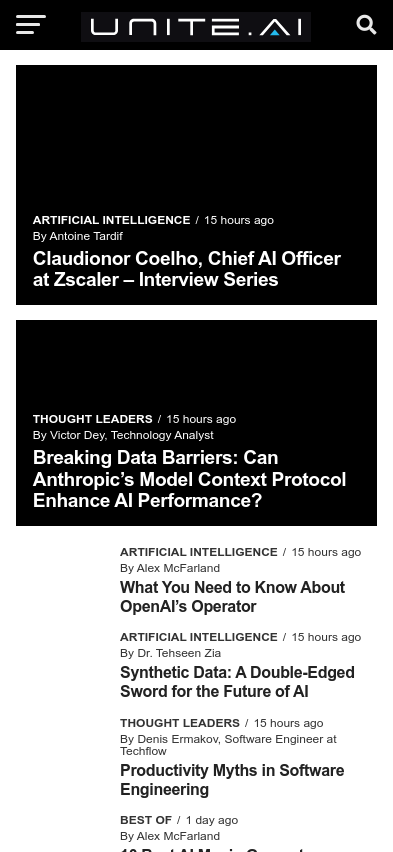
Unite.AI is a platform focused on the dissemination of knowledge related to artificial intelligence, offering news, tools, and resources in various sectors like business, education, and technology. Unite.AI is a platform that focuses on Artificial Intelligence-related tools, news, certifications, and conference information. It offers resources on various AI applications across multiple industries.
Unite.AI is a comprehensive resource providing insights, tools, and updates in the domain of artificial intelligence (AI) and its application across various industries. Key areas of interest include AI tools, events, news, educational resources, interviews, thought leadership, and regulations.
AI Tools and Applications:
- **Business Applications:**Tools such as chatbots, code generators, and various industry-specific solutions like legal assistants and marketing automation are discussed. These tools are designed to enhance efficiency and streamline operations for businesses across multiple sectors.
- Creative and Content Generation: The platform also explores the realm of creative AI, offering insights into music and image generators, video and voice tools, and headshot creation technologies.
- Trading and Financial Services: AI-driven platforms for crypto and stock trading, highlighting tools that automate and optimize trading strategies, are also covered extensively.
- Education and Learning Solutions: Educational AI tools that improve personalized learning experiences and provide teachers with innovative instructional aids are described.
Highlighted Tools:
- Jasper and Pictory: Writing and video generation tools are highlighted for their application in content creation and marketing.
- Murf and Synthesys: These are featured for their capabilities in AI voice generation, offering text-to-speech solutions for varied content creation needs.
- Chatling and QuickBlox: These tools exemplify AI's integration into customer engagement and chatbot technology, showcasing advanced natural language processing capabilities.
Events and News:
- The content includes information on various AI and technology-focused conferences, along with updates on new AI regulations and ethical guidelines.
- In-depth interviews and thought leadership pieces provide perspectives from industry leaders and innovators in the AI space.
Education and Professional Development:
- Educational content emphasizes the importance of AI in fostering an informed and prepared workforce. This includes AI-driven platforms aiding in teaching and personalized learning plans.
- Certifications and courses in AI, machine learning, and data science are also featured, illustrating career pathways and educational opportunities in technology.
Emerging Technologies and Research:
- Artificial General Intelligence (AGI) and Quantum Computing: Explorations into next-generation technology, such as AGI, quantum computing, and brain-machine interfaces, are presented as transformative forces in the industry.
- Healthcare Innovations: AI's role in healthcare, including innovations in diagnostics and patient care, is explored to demonstrate tangible positive impacts on public health.
Security and Ethical Considerations:
- Cybersecurity and Privacy: With the increasing reliance on AI systems, concerns regarding data security and users' privacy are addressed. Tools like Aragon, for AI-based headshot generation, stress encryption and user data protection standards.
- Ethics in AI: The platform advocates for responsible AI usage, focusing on ethical considerations and the establishment of guidelines to prevent misuse.
Overall, Unite.AI aims to serve as a pivotal resource for individuals and organizations navigating the evolving landscape of AI, from those looking to implement AI tools in their operations to those interested in the broader implications of AI technology.
Loris.ai
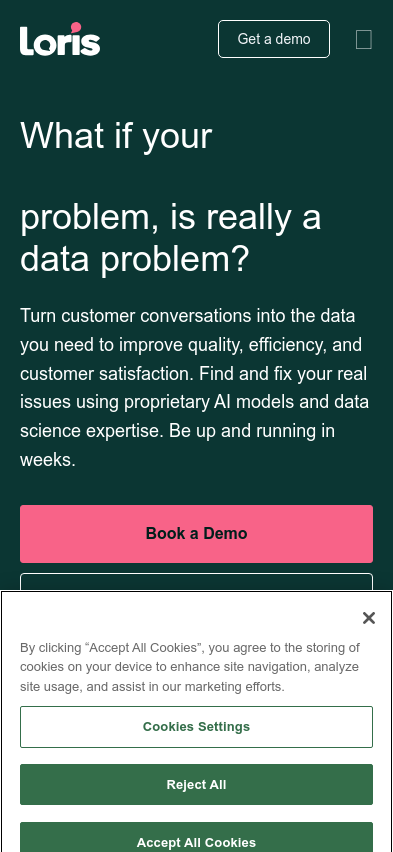
Loris.ai offers AI tools to enhance customer service, including Customer Insights, Quality Assurance, and Agent Co-Pilot, transforming experience data into competitive advantages.
Loris is a company offering AI-powered solutions designed to improve customer experience (CX) through advanced analytics of customer interactions. Here's a concise summary of their offerings and features, based on their website's content:
AI Product Portfolio:
-
Customer Insights: Loris provides complete Voice of the Customer insights from all interactions across customer service platforms. This solution captures detailed feedback without relying on traditional surveys, thus covering a larger data set for analysis. It aims to help businesses spot emerging issues early and track various trends over time.
-
Quality Assurance: Loris transforms quality assurance into structured quality intelligence. Their AI automates conversation assessments to improve efficacy and consistency, helping QA teams focus more on agent performance rather than manual review processes.
-
Agent Co-Pilot: This tool provides real-time guidance to customer service agents, recommending the best responses and workflows to ensure accurate, empathetic, and consistent communication. It aims to enable agents to improve speed and empathy in their interactions while complying with company policies.
-
The Gist - Conversation Summarization: Aims to reduce after-call work by automatically summarizing conversations. This reduces the need for manual data entry and allows teams to focus on customer solutions more effectively.
-
Ask Loris: This platform reduces the time spent on data analysis by delivering streamlined insights directly derived from customer interactions. It skips detailed analytical processes to provide immediate answers.
Platform and Integration:
-
Loris AI Platform is engineered to provide quick start-up with pre-built integrations across customer service platforms. It delivers results rapidly by leveraging proven AI models, negating the need for lengthy training or set-up processes.
-
Integrations: Loris connects seamlessly with existing customer service systems, transforming voice, chat, and email interactions into comprehensive datasets that report on sentiment, resolution, and issue categorization.
Industry Uses:
Loris targets multiple industries with specific tailor-made solutions, such as:
- Fintech & Financial Services: Focused on understanding accountholder experience to swiftly resolve inquiries and improve service delivery.
- Retail & eCommerce: Aimed at increasing brand loyalty by understanding customer needs and operational efficiency through interaction analytics.
- Telecom: Supports telecom sectors by identifying larger issues hidden within customer inquiries and automating performance tracking for better service.
- Customer-Obsessed Brands and BPOs: Helps brands streamline and personalize customer experiences, delivering insights that contribute to maintaining superior customer service.
Security and Trust:
Loris emphasizes the importance of data security and compliance. The platform is stated to be SOC 2 Type 2 and GDPR compliant, which indicates detailed, structured protection of customer information.
Recognition:
The company has been recognized as a "Cool Vendor" in Gartner's 2024 report for Customer Service & Support Technology, showcasing their potential to transform customer service operations with innovative AI-driven solutions.
Conclusion:
Loris offers a comprehensive suite of AI-driven solutions designed to enhance customer service by transforming interactions into actionable data. Their products are designed to expedite issue resolution, support quality assurance, and provide real-time agent guidance, which ultimately aims to create a more efficient and empathetic customer experience across industries.
Cognigy
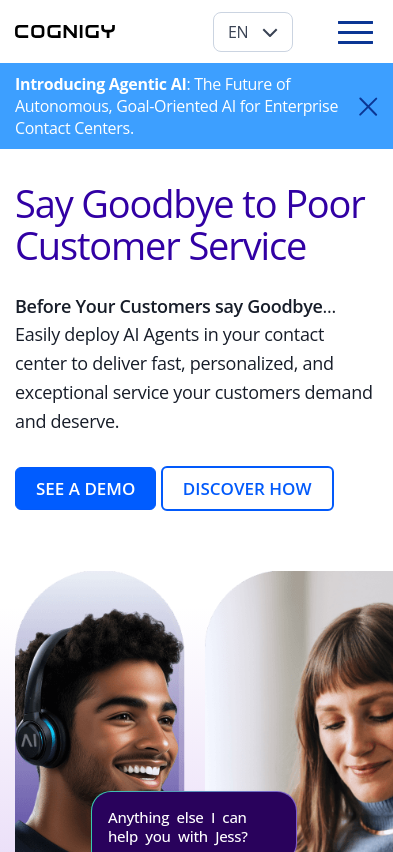
Cognigy is a German-based enterprise conversational AI platform aimed at automating customer and employee support processes, with $169M in funding.
- Key Focus Area:
Cognigy primarily focuses on enhancing customer engagement and streamlining communication within enterprise contact centers through the use of conversational AI. They aim to transform how enterprises interact with customers by deploying fully pre-trained AI agents that enhance efficiency and customer service quality across various communication platforms such as voice, chat, and messaging.
- Unique Value Proposition and Strategic Advantage:
Cognigy's unique value proposition lies in its ability to deliver an autonomous, goal-oriented AI workforce that adapts and responds in a human-like manner across multiple channels. Their strategic advantage stems from the integration of advanced AI capabilities such as Large Language Models (LLMs) for cognitive reasoning, allowing AI agents to think dynamically and adjust their responses based on real-time interactions and customer data. Additionally, their AI solutions are easily customizable and integrate smoothly into existing enterprise systems, enabling seamless customer service improvement without significant infrastructure overhauls.
- Delivery on Value Proposition:
Cognigy delivers on its value proposition through a suite of AI-driven tools, known collectively as the Cognigy.AI platform, including:
-
Agentic AI: Their AI agents are equipped with cognitive reasoning abilities that allow them to autonomously navigate complex customer interactions, decompose tasks, and work effectively with both human and AI agents.
-
Omnichannel Capabilities: Cognigy's AI Agents can operate seamlessly across various communication channels, providing consistent and high-quality service, whether via voice, chat, or messaging.
-
Integration and Flexibility: The platform integrates with a variety of enterprise technologies like Amazon Connect, Avaya, Genesys, Salesforce, and more. This flexibility ensures that AI Agents are easily deployed and provide an immediate positive impact on customer experience.
-
Real-time Assistance and Knowledge AI: Agents are supported by a robust semantic search and knowledge management system, which allows them to access and utilize enterprise-specific information in their interactions, enhancing service personalization and accuracy.
-
Agent Copilot: This tool enhances live support by providing real-time coaching and automated support to human agents, thereby increasing productivity and service quality.
Cognigy positions itself as a scalable solution for enterprises aiming to enhance customer service, reduce handling time, and ultimately increase customer satisfaction through advanced conversational AI technologies. They leverage integrations with existing enterprise systems to ensure a smooth transition and rapid deployment, which is further facilitated by their low-code UI designed for ease of use by non-technical users. This strategic focus on AI innovation and seamless integration helps Cognigy optimize both customer and agent experiences effectively.
Albert

Albert is an AI-driven marketing assistant that creates targeted ads, tracks performance, and optimizes spending for improved results across multiple channels.
Albert.ai is an artificial intelligence (AI) platform designed to enhance digital marketing campaigns by integrating with existing technology and serving as an autonomous ally for marketers. Its services and technology are thoroughly outlined through various segments on its website, covering products, vision, impact, pricing, and more. Here's a concise summary of these key components:
Vision and Approach
- Future of Marketing: Albert.ai envisions a digital marketing landscape where by 2025, all paid media campaigns will be managed through a collaboration between human marketers and autonomous AI systems.
- Technology Evolution: Transitioning from manual tasks and static algorithms to autonomous AI, the platform aims to provide a machine that not only performs designated tasks but also supports marketers through insights, data analysis, and real-time optimization.
Product and Features
- Self-Learning and Autonomous: The AI platform efficiently handles tasks such as campaign design, cross-channel strategy execution, creative optimization, keyword grouping, budget allocation, and ad spend reporting.
- Targeting Capabilities: Supports integration with platforms like Google, Facebook, Instagram, and Bing, allowing access to about 90% of the biddable inventory online.
- User Involvement: While AI handles operational aspects, strategic decisions and creative inputs remain human responsibilities.
- Insights Generation: Albert uses data-driven insights to optimize campaigns continuously, focusing on creative performance, audience segmentation, and adapting to real-time market changes.
Impact and Success Stories
- Retail and Financial Services: Case studies illustrate how brands like Crabtree & Evelyn and Interactive Investor have seen improved Return on Ad Spend (ROAS) and significant performance improvements by leveraging Albert’s capabilities.
- CPG and E-commerce: The platform's AI-driven approach has facilitated significant revenue increases by identifying new market opportunities and optimizing customer engagement strategies.
AI's Role in the Marketing Ecosystem
- Assistance, Not Replacement: Highlighted interviews and blogs discuss how AI won't replace marketers but enhance their value by taking over repetitive and data-heavy tasks, allowing greater focus on strategy and creativity.
- Human-AI Collaboration: The platform is designed to work synergistically with human teams, helping automate routine tasks and providing deeper insights for strategic planning.
Pricing and Support
- Customized Plans: Clients are encouraged to contact Albert.ai for tailored pricing solutions based on company size and campaign needs.
- Support System: The platform offers a dedicated customer success team to ensure smooth implementation and ongoing support.
Privacy and Data Handling
- User Data: Albert.ai processes data through platform integrations (e.g., Google, Meta) without access to clients’ internal or sensitive data, ensuring privacy compliance.
Albert.ai represents a shift towards a data-driven marketing era where AI systems facilitate smarter decision-making and campaign optimizations, providing marketers the tools needed to harness deeper insights and outcomes in a competitive digital landscape. Through strategic AI implementation, Albert aims to bridge the gap between technical capabilities and human creativity in digital marketing.
Mogic AI
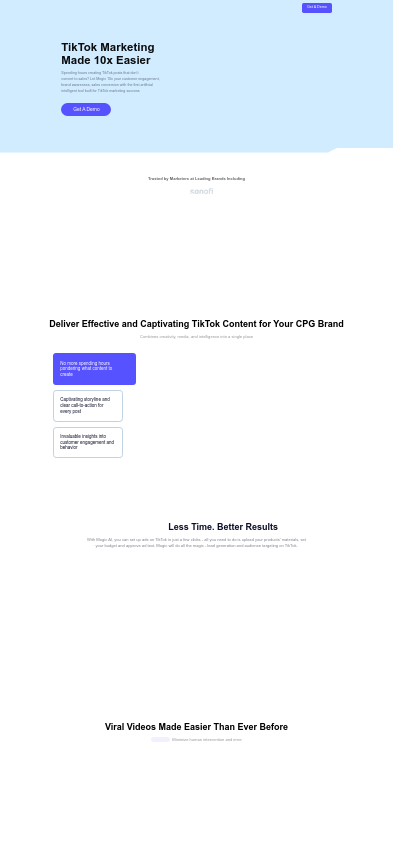
Mogic AI is China's leading AI-native marketing technology company, offering end-to-end solutions for enterprise clients, including marketing strategy insights, AI content creation, advertising distribution, and digital asset management services. It is known for leveraging AI automation to reduce costs and increase efficiency, serving major brands like Alibaba, Pepsi, L'Oréal, Unilever, and Johnson & Johnson.
Mogic is a platform designed to enhance collaboration within organizations by integrating various tools and automating processes. The platform focuses on improving workflow efficiency and boosting productivity through its centralized approach.
Key Features:
-
Centralized Collaboration: Mogic offers a unified space where teams can collaborate effectively. The platform provides tools to manage projects, tasks, and communications all in one place.
-
Integration Capabilities: The platform allows seamless integration with third-party applications and services, which helps in reducing the time spent on switching between different tools.
-
Automation: Mogic emphasizes automation to streamline repetitive tasks and processes. This feature reduces human error and saves time, allowing team members to focus on more critical tasks.
-
Data Security: Security is a high priority, and the platform incorporates advanced security measures to protect sensitive data and ensure information privacy.
-
Real-Time Updates: Team members can stay up-to-date with real-time notifications and updates, which helps coordinate efforts and maintain productivity.
Target Audience:
- Businesses and organizations seeking to improve operational efficiency.
- Teams needing a central platform to collaborate on projects.
- Companies aiming to automate workflows and enhance productivity.
Benefits:
- Improved efficiency through reduced manual tasks and process automation.
- Enhanced communication and collaboration among team members.
- A streamlined workflow with the ability to integrate multiple applications.
Use Cases:
-
Project Management: Teams can manage their projects from start to finish using Mogic's tools and features, ensuring each phase is completed efficiently.
-
Task Automation: By automating routine tasks, businesses can focus on strategic goals rather than administrative burdens.
-
Cross-Functional Collaboration: Mogic supports collaboration across different departments, allowing for more cohesive efforts toward organizational goals.
In summary, Mogic is presented as a comprehensive platform aimed at enhancing organizational productivity through collaboration, integration, and automation. It caters to businesses looking to optimize their workflows by providing a centralized hub for managing projects and communications efficiently.
Userbot.ai

Userbot.ai is an advanced chatbot system that learns from conversations to improve its response capabilities over time.
Userbot offers a comprehensive suite of AI-powered solutions designed to automate and optimize customer interactions across various industries, including healthcare, finance, public administration, retail, and energy utilities.
Key Offerings:
-
AI Conversational Platform: Userbot provides a unified platform for creating virtual assistants powered by AI, integrating with various communication channels such as web, social media, and business systems, available 24/7.
-
AI Voice & Digital Human: These solutions enable the creation of realistic digital human avatars and intelligent voice assistants, aimed at enhancing customer experiences with lifelike interactions.
-
Omnichannel Approach: Userbot's platform supports multichannel communication, allowing for seamless integration across platforms such as WhatsApp, Messenger, web, and mobile applications.
Industry Applications:
-
Healthcare:
- Patient Experience: Userbot assists in booking appointments, improving communication between patients and healthcare providers, and managing routine administrative tasks to free up medical professionals for more critical duties.
- Digital Human Avatars: These provide a realistic, empathetic touch to patient interactions, enhancing the overall healthcare experience.
-
Finance:
- Customer Assistance: The platform automates customer queries, reducing operational costs, and providing tailored financial advice and information to clients.
- Data Analysis: It collects and analyzes customer interaction data to improve service offerings.
-
Public Administration:
- Service Optimization: Userbot enhances citizen engagement by automating responses to public inquiries and improving access to services beyond typical office hours.
- Data Insights: Collecting feedback helps public offices refine their services for better transparency and efficiency.
-
Retail:
- Customer Support: The platform automates routine inquiries, manages customer relationships, and analyzes consumer behavior to improve service delivery.
- Human-like Interactions: Digital Assistants provide seamless customer experiences both online and in physical retail environments.
-
Energy & Utilities:
- Process Automation: Userbot automates routine operations like billing and emergency reporting, enhancing service delivery efficiency.
- Customer Engagement: The solution helps in maintaining effective communication with clients, providing quick solutions and detailed interaction summaries.
Technological Features:
- No-Code Interface: Userbot offers a user-friendly drag-and-drop interface allowing businesses to adjust bot training without technical expertise.
- Continuous Learning: The AI continually improves by interacting with users, enhancing its ability to engage authentically.
- Real-Time Translation: Facilitates communication in over 100 languages, ensuring inclusivity and global reach.
Customer Success Stories:
Userbot showcases several case studies where its solutions have successfully transformed customer service operations in sectors like healthcare and energy. Notable clients include Aboca in the pharmaceutical sector and the Policlinico A. Gemelli in healthcare, where AI bots support patient interactions and streamline processes.
Business Insights:
The content emphasizes AI's role in reducing operational costs, speeding up service delivery, and improving customer satisfaction by automating up to 90% of routine interactions without human intervention. Additionally, the ROI calculator tool provides insights into the financial and efficiency gains achievable through implementing Userbot's AI solutions.
Call to Action:
Userbot encourages potential users to request demos and discover firsthand how their AI solutions can benefit various sectors. They also highlight the availability of partnerships and employment opportunities for those interested in expanding Userbot's offerings.
Leena AI

Leena AI is an AI-powered HR companion designed to engage employees effectively.
Leena AI is focused on transforming enterprise operations by deploying autonomous AI agents to streamline processes across IT, HR, and Finance departments. Central to their offering is a generative AI-powered virtual assistant that aims to reduce internal enterprise tickets and enhance employee experience by automating queries and optimizing workflow across enterprise systems.
Key Offerings and Features:
-
Autonomous Agent: A generative AI agent capable of handling complex tasks across multiple applications via a single prompt, transitioning processes from inefficient to streamlined and centralized.
-
Knowledge Management: By integrating with popular knowledge bases, Leena AI offers centralized access to up-to-date enterprise information, enhancing employee support and identifying gaps in knowledge management.
-
Security and Compliance: Leena AI emphasizes data privacy, with robust security measures such as EU AI Act compliance, data never being used for model training, and global service hosting on platforms like AWS and MS Azure. Their commitment to security extends to compliance with standards like ISO 27001 and SOC 2.
-
Multilingual and Multi-channel Support: The AI agent supports over 100 languages and seamlessly integrates with existing communication channels to ensure comprehensive enterprise coverage.
Recognitions and Integrations:
-
Industry Recognition: The company is acknowledged in several Gartner Hype Cycles across various categories, highlighting their prominence in virtual assistants for IT service management and conversational AI solutions.
-
Integration Capability: Leena AI boasts wide-ranging integrations with tools such as Jira, Google Suite, ServiceNow, and Salesforce, enhancing ITSM, ERP, CRM, and HRIS functionalities.
Case Studies and Impact:
-
Global Reach and Adoption: Leena AI serves over 20 million employees in 500+ organizations globally, indicating widespread adoption and trust among leading enterprises.
-
Customer Success Stories: Testimonials from clients like Coca-Cola and Globe Telecom emphasize improvements in ticket resolution times, decreased manual intervention, and enhanced employee engagement and productivity.
Resources and Learning Opportunities:
-
Comprehensive Content: Leena AI offers resources like case studies, blogs, glossaries for AI and HR terms, and documentation to assist organizations in leveraging AI for operational efficiency.
-
Partnership Opportunities: They engage in strategic partnerships to broaden their technological reach, offering technology and implementation alliances to expand service offerings.
Company Philosophy:
Leena AI is driven by the vision of a "zero-ticket enterprise," promoting efficiency and productivity through AI-enabled solutions that foster an engaged and well-informed workforce environment. Their focus on innovation, customer satisfaction, and setting industry standards in AI deployment for enterprises are evident from their recognized contributions to enhancing service delivery and employee experience.
Lucy

Lucy is an AI-powered enterprise knowledge management platform that allows organizations to quickly retrieve the most relevant answers from their data sources. It offers an AI-powered assistant that transforms data into findable answers and improves over time through machine learning.
Lucy® is an AI-powered platform designed for enterprise knowledge management. It aims to address challenges faced by organizations in managing and accessing vast amounts of data stored across various systems. Here are the core features and benefits of the platform:
Key Features:
-
AI-Powered Search: Lucy acts as an AI-powered Search Answer Engine®, capable of sifting through terabytes of data, and returning specific, relevant answers instead of just a list of results. It highlights the exact page, chart, or paragraph from your data sources.
-
Data Integration: Lucy doesn’t require data to be moved into its system. It integrates with existing data storage and third-party subscriptions, learning and accessing information directly where it resides. This includes a multitude of integrations such as Box, SharePoint, SAP, Salesforce, and more.
-
Metadata and Document Search: The platform automatically generates metadata, facilitating easier data management without the need for manual tagging.
-
Machine Learning: Lucy continuously learns from user interactions, improving its accuracy and effectiveness over time.
Benefits for Organizations:
-
Increase Efficiency: Lucy facilitates quick access to organizational knowledge, which can drastically reduce the time spent by employees searching for information, thereby saving costs associated with redundant research.
-
Tribal Knowledge Preservation: It provides a centralized knowledge base preserving information that would otherwise be lost due to employee turnover or organizational changes like mergers and acquisitions.
-
Security and Compliance: Lucy complies with data security standards such as ISO/IEC 27001 and supports GDPR and CCPA compliance. It allows organizations to retain control over their data security protocols.
-
Various Access Points: Whether through web applications or embedding within tools like Microsoft Teams or Slack, Lucy offers multiple ways for users to interact, enhancing user experience and adoption.
Target Users and Use Cases:
-
Cross-Departmental Support: Lucy benefits departments like Human Resources, Customer Success, IT, and Sales by providing a centralized hub for training materials, customer service solutions, and sales enablement resources.
-
Knowledge Activation for Teams: The platform supports organizational teams by centralizing insights, increasing collaboration, and promoting a do-it-yourself environment for finding information.
Pricing and Packages:
Lucy offers customizable pricing models, adaptable to various organizational needs and scales. It includes setup and integration fees within subscription plans, ensuring cost-effective solutions for knowledge management.
Insights and Resources:
- Blogs and Webinars: Lucy provides a wide array of resources aimed at educating users on effective knowledge management practices and evolving technology trends.
- Client Stories and ROI: Success stories highlight how companies, including Fortune 1000 enterprises, benefit from employing Lucy's knowledge management capabilities. An ROI calculator is also available to assess the financial benefits of implementing Lucy in an organization.
Lucy's role is emphasized as more than a tool; it’s portrayed as a key team member that enhances productivity and efficient information retrieval across an organization. This approach to AI in enterprise settings highlights the growing importance of intelligent systems in managing complex data environments.
Personal AI
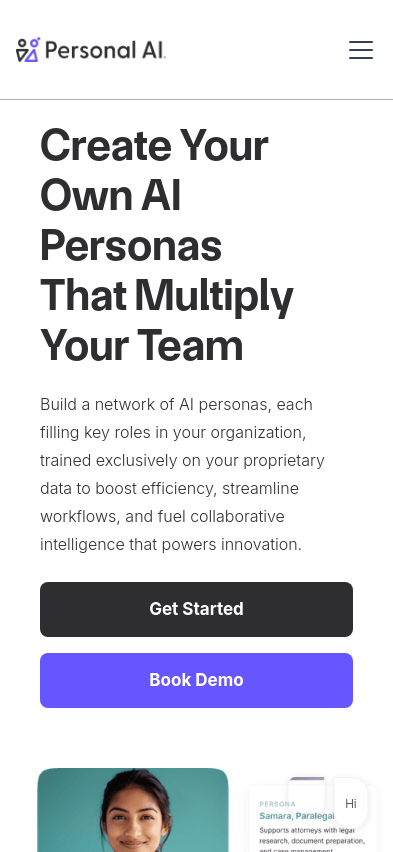
Personal AI offers tools for personal knowledge management and productivity by harnessing AI to organize thoughts and information distinctively. Personal AI allows users to create unique AI personas personalized to user data, integrating with services like HubSpot CRM and offering personal language models.
-
Key Focus Area: Personal AI primarily centers around creating highly personalized artificial intelligence (AI) solutions tailored to individual and organizational needs. Their emphasis is on developing AI personas, or digital representations of job functions and entities, which improve workflow efficiency, enhance knowledge retention, and enable more sophisticated automation for decision-making processes across sectors like finance, legal, and small-to-medium businesses (SMBs).
-
Unique Value Proposition and Strategic Advantage: Personal AI's unique value proposition lies in its commitment to ensuring user privacy, data ownership, and bespoke customization for each AI model. Their AI solutions are distinctively personal, giving users full control over their data and the ability to tailor their AI to specific needs. This approach is a departure from generic large language models provided by major technology companies, focusing instead on Personal Language Models (PLMs) that integrate deeply with personal data for a highly customized experience. Strategic advantages include:
- Data Ownership: Users retain full control over their data, with robust privacy measures ensuring information is secure and not shared without consent.
- Customization: The platform offers detailed personalization of AI models to align with specific roles and tasks, including capabilities for identity, branding, and voice customization.
- Integration and Seamlessness: Offers integrated solutions across various platforms, enhancing productivity by embedding AI functionalities directly within user workflows.
-
Value Proposition Delivery: Personal AI delivers on its value proposition through several key mechanisms:
-
Training and Integration Tools: Utilizing an AI Training Studio and APIs, users can train their AI models effectively, ensuring that the AI reflects the user's communication style, preferences, and operational needs. The intuitive platform allows for streamlined uploads and memory enhancements, facilitating efficient model training.
-
Privacy and Security: Adopts stringent privacy protocols such as encryption, compliance with GDPR and HIPAA (planned), and SOC2 certification. These measures protect user data at every stage, reinforcing trust.
-
AI Native Messaging and Personas: The platform supports AI-driven communication through private messages and collaborative channels, leveraging AI personas trained on proprietary data. This setup enhances communication efficiency within organizations and ensures continuous access to knowledge and resources.
-
Use Cases and Industries Served: Extends its offerings to various sectors such as legal, finance, and SMB markets, where AI personas can handle significant data volumes, automate repetitive tasks, and maintain operational continuity.
-
User-centric Design: Emphasizes a user-friendly interface that allows easy interaction with AI through text, voice, and multi-modal capabilities, adapting seamlessly to both personal and professional scenarios.
-
Overall, Personal AI pitches itself as a versatile tool for personalizing digital interactions, safeguarding data, and enhancing everyday business processes with AI-driven efficiencies.
Kira Systems

Kira Systems creates machine learning software to identify, extract, and analyze text in contracts and documents.
Kira Systems focuses on leveraging artificial intelligence (AI) to streamline and enhance the efficiency of contract analysis processes. The company's core specialization lies in transforming how businesses manage and review documents by identifying, extracting, and analyzing content within contracts using patented machine learning technology.
Unique Value Proposition and Strategic Advantage:
-
Patented Machine Learning Technology: Kira's strategic advantage is deeply rooted in its proprietary technology. This AI-powered solution is designed to extract complex concepts and data points with high accuracy that surpasses traditional rules-based systems. This innovation allows users to conduct comprehensive reviews of documents, minimizing errors, and enhancing the speed and efficiency of analyses.
-
Built-In Intelligence and Quick Study Tools: Kira offers over 1,000 smart fields, enabling users to quickly extract common provisions and clauses. Additionally, the Quick Study feature empowers organizations to create custom models without requiring programming skills, addressing specific data needs and improving organizational adaptability.
-
Adaptable Workflows and Partner Ecosystem: The platform supports seamless integration and management of workflows, enhancing collaboration and transparency within teams. Its partner ecosystem further allows users to incorporate Kira into their existing tech stack, delivering greater flexibility and empowerment to organizations.
Delivery Mechanisms for Their Value Proposition:
-
Automated Contract Analysis: Kira automates document importing, processing, and analysis, making it easy for users to extract significant contract information quickly. This reduces the reliance on time-consuming manual reviews, optimizing workflow efficiency and allowing users to focus on high-value tasks.
-
Comprehensive Reporting Tools: Users can generate detailed reports and summary charts from Kira's Dashboard. This feature provides a clear overview of significant findings, allowing for better communication of risks and insights within project teams and to clients.
-
Sector-Specific Applications: Kira caters to a broad array of sectors including law firms, professional services, retail, insurance, proptech, and financial services among others. Each application is tailored to the unique needs of the sector, from M&A due diligence and lease abstraction to risk mitigation and audit transformation.
-
Enhanced Project and Risk Management: Kira's predictive risk assessment tools allow for proactive identification of contractual exposures. This leads to improved decision-making processes, helping organizations to manage risks effectively across various business units and industries.
In summary, Kira Systems positions itself as a facilitator of digital transformation through AI-driven contract analysis, offering bespoke solutions across a diverse range of industries. By providing a robust, adaptable platform with a strong focus on machine learning technologies, Kira enables organizations to optimize their contract review processes, mitigate risks, and drive operational efficiencies.
Lydia AI

Lydia AI is a platform for health insurers using artificial intelligence.
Lydia AI: Company Overview and Strategic Focus
-
Key Focus Area: Lydia AI concentrates on revolutionizing the insurance industry by employing artificial intelligence (AI) to develop personalized and predictive health scores. Their solutions aim to make life and health insurance more accessible and efficient by enabling insurers to underwrite policies faster and more accurately. The primary focus is on improving customer experience, enhancing agent capabilities, and optimizing algorithmic underwriting processes.
-
Unique Value Proposition and Strategic Advantage: Lydia AI's value proposition lies in its ability to transform unstructured data from various sources into actionable health insights that improve underwriting decisions. The strategic advantage is derived from their AI-driven predictive health scoring system, which utilizes machine learning algorithms validated against clinical and actuarial benchmarks. They leverage vast datasets (over 33 million lives) to deliver granular risk assessments that help insurers better understand an individual's health status without needing a medical examination.
-
Delivery on Value Proposition:
-
Predictive Risk Analytics: Lydia AI provides insurers with predictive insights drawn from digital data sources, enabling instant and reliable assessment of health risks. This reduces the need for traditional exams and shortens the underwriting process, increasing approval rates and minimizing risk.
-
AI-Powered Sales and Customer Experience: The company's WellAged app streamlines the insurance-buying process through an omni-channel approach, offering personalized customer journeys that integrate both physical and digital touchpoints. This enhances the pre-sales and purchase experience, boosting sales conversions and customer satisfaction.
-
Role-Specific Solutions: Lydia AI offers tailored solutions for different stakeholders. Insurance agents gain tools to digitize workflows and improve sales, while underwriters receive AI-supported insights to optimize decision-making, ensuring alignment with industry benchmarks.
-
Data-Driven Integrations: Through partnerships and open data utilization, Lydia AI is continuously expanding and improving its platforms. These integrations support comprehensive health assessments and product recommendations that align with individual needs.
-
In summary, Lydia AI's focus on data-driven, AI-enabled solutions sets them apart in the insurance sector. By converting complex health data into understandable health scores, they facilitate more informed insurance underwriting and sales processes. Despite their innovative offerings, it is important to keep in mind that this description is promotional, and actual results and performance should be evaluated thoroughly.
Kleene
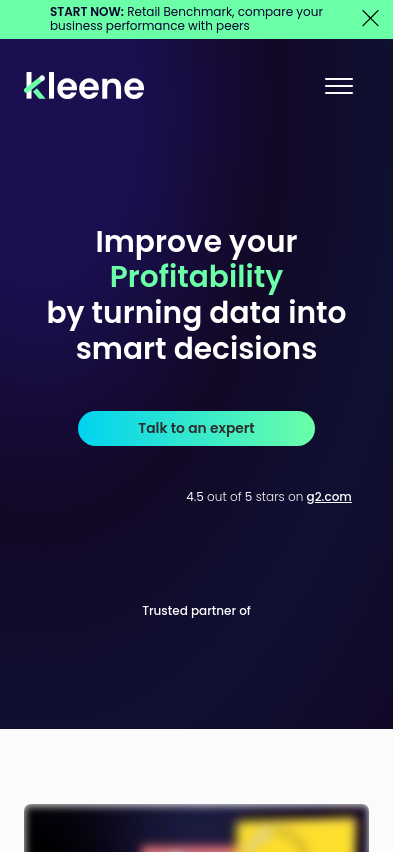
Kleene offers a data consolidation platform that enables businesses to centralize data sources, transforming them into a single language for analysis and collaboration, thus facilitating better data management and insights.
Kleene.ai Overview
1) Key Focus Area:
Kleene.ai's central focus is on empowering businesses to harness the power of data analytics and artificial intelligence (AI) to drive decision-making and optimize operational efficiency. The company emphasizes data integration, data management, AI applications, and analytics consulting, primarily targeting areas like customer acquisition, retention, product optimization, and overall business intelligence.
2) Unique Value Proposition and Strategic Advantage:
Kleene.ai distinguishes itself with the following value propositions:
-
Rapid Deployment and Integration: It offers fast setup times, leveraging over 600+ pre-built data integrations to allow businesses to organize and analyze data swiftly without a lengthy implementation process.
-
Comprehensive, Unified Data Platform: The platform provides a unified approach, organizing data across the organization to create a single source of truth, enhancing accuracy and speed in decision-making without requiring extensive infrastructural changes.
-
AI-Powered Insights and Custom Solutions: Kleene.ai provides pre-built AI models to facilitate advanced analytics, empowering strategic initiatives such as hyper-personalization and supply chain optimization. The company also offers customized solutions for clients lacking required connectors, thus broadening their integration capabilities.
3) Delivery Mechanisms for Their Value Proposition:
Kleene.ai supports its offerings through several mechanisms:
-
Modular Product Offering: Their services are scalable and priced as per modular offerings, allowing customers to select specific solutions based on their needs. This includes tools for ELT (Extract, Load, Transform), AI applications, and data visualization.
-
Supporting Data Ecosystem: With a range of services, such as data consulting and fractional CDO services, Kleene.ai assists businesses without in-house expertise to define and implement data strategy goals effectively.
-
Technical Support and Continuous Improvement: Kleene.ai ensures constant support through data experts and a robust data management platform to handle complex data operations and analytics. They also commit to continuing software enhancement and maintenance, such as building custom connectors as required by clients.
-
Flexible Platform Use: Businesses already utilizing BI tools (like Tableau, PowerBI) can continue using them while integrating Kleene.ai’s robust data models to enhance their analytics processes.
In summary, Kleene.ai positions itself as a comprehensive data solutions partner, offering efficient integration and innovative AI applications that streamline data management, driving strategic business outcomes without necessitating significant changes or upfront investments.
Lily AI

Lily AI is an artificial intelligence startup focused on enhancing the online shopping experience by providing personalized product recommendations for e-commerce platforms.
Lily AI: A Strategic Overview
1) Key Focus Area:
Lily AI specializes in enhancing e-commerce activities, primarily focusing on product attribution and data enrichment to optimize search and increase conversion rates for fashion, home, and beauty sectors. Their technology is designed to align product descriptions and ad copy with consumer language, thus improving the effectiveness of both on-site and off-site search functionalities.
2) Unique Value Proposition and Strategic Advantage:
The company's value proposition lies in its proprietary AI technology that transforms standard retailer catalog descriptions into consumer-centric language, thereby increasing relevance and engagement. Their strategic advantage is derived from:
- AI Models: These models are trained to extract product detail from catalogs and translate them into more appealing, naturally understood consumer language.
- Proprietary Datasets: They leverage unique, proprietary data sourced from top retail and public datasets to uncover insights unavailable to competitors.
- Data and Enrichment Layers: This allows them to create enriched product attributes that resonate with shopper language beyond basic descriptors like color or cut.
3) Execution of Value Proposition:
Lily AI operationalizes its value proposition through several key strategies:
- Enhanced Product Attribution: By dissecting and reconstructing product data into consumer-relevant language, they improve search outcomes and overall customer engagement.
- Comprehensive Product Copy Generation: This involves crafting product titles and descriptions that both appeal to shoppers and enhance search engine optimization.
- Targeted Trend Alignment: They keep products relevant by monitoring seasonal and emerging trends.
- Occasion Matching: Synchronizing products with global events and holidays ensures timely relevance in marketing strategies.
- Strategic Use Cases: Their platform is incorporated into client workflows to maximize the potential of AI insights in real-world scenarios.
Lily AI also emphasizes consistent and enriched product discovery across all channels, including marketplaces and digital advertising such as Google Shopping Ads. By leveraging natural language processing, they aim to boost ad impressions and conversions, leading to measurable increases in sales.
In summary, Lily AI's approach revolves around translating retailer-centric product data into the language that resonates with consumers. Their unique combination of advanced AI models, proprietary datasets, and enriched data insights positions them to enhance the e-commerce success of their clients in targeted verticals like fashion, beauty, and home goods. They implement this strategy through targeted enhancements in search capabilities and engaging content delivery that aligns with consumer trends and behaviors.
Abacus.AI
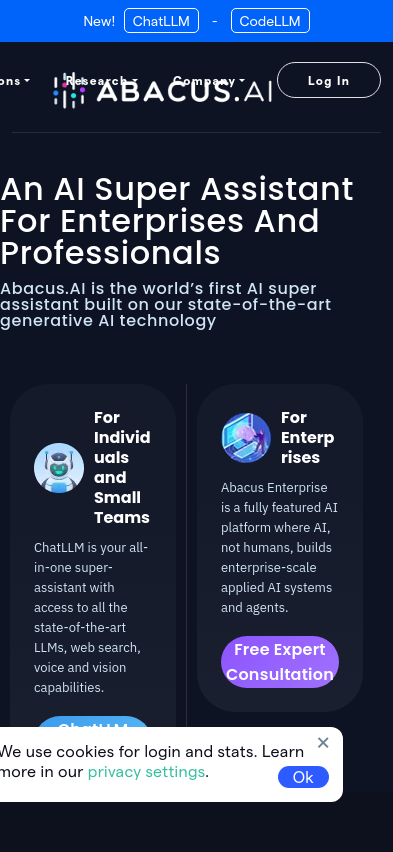
Abacus.AI enables businesses to implement AI without needing expert developers by offering pre-trained models for tasks like customer service and forecasting. Abacus.AI offers pre-trained models for business tasks like customer service, simplifying AI implementation without expert developers.
News | About | About | About | About | About | About | About | About | About | About | About | About | About | Vision/Values | About | Vision/Values | About | About | About | About | About | About | About | About | About | About | About | About | About | About | About | About | About | About | About | About
-
Company's Key Focus Area: Abacus.AI is primarily focused on providing AI-driven solutions tailored for both individual professionals and large enterprises. Their main goal is to automate and enhance business processes through the use of AI technology. This includes a broad range of applications, such as predictive modeling, personalization, anomaly detection, and AI-based decision-making tools. They offer platforms and tools to build AI agents and chatbots, optimize resources through discrete optimization, and utilize vision AI for modeling tasks.
-
Unique Value Proposition and Strategic Advantage: Abacus.AI positions itself as an AI super-assistant that leverages generative AI technology to automate various business processes. Their strategic edge lies in their state-of-the-art AI capabilities, including structured machine learning, vision AI, and personalized solutions, along with a commitment to open-source generative AI models. They claim that their AI systems can enhance productivity and efficiency by automating complex tasks and reducing human intervention.
-
Delivery on Their Value Proposition: To deliver on its value proposition, Abacus.AI employs:
-
AI Super Assistants: Tools like ChatLLM and CodeLLM are designed to integrate AI capabilities across platforms, providing services like web search, image generation, and code editing.
-
Comprehensive AI Platform: For larger organizations, they offer a platform capable of building enterprise-scale AI systems, using AI to create and manage other AI agents and processes. This platform aims to automate tasks such as fraud detection, contract analysis, and personalized marketing.
-
Structured ML and Predictive Modeling: Abacus.AI provides tools to create machine learning models tailored to specific data inputs, ensuring accurate business predictions and process optimizations.
-
Vision AI and Optimization: These services offer advanced solutions for image analysis and optimizing business processes under given constraints, aimed at reducing costs and increasing efficiency.
-
Integration and Customization: The company offers integration with existing data systems, allowing for customization and personalized setups that fit specific business needs and enable contextual AI interactions.
-
Consultation and Support: They provide consultations to help enterprises tailor the AI solutions to their specific requirements and offer support throughout the implementation process.
-
Overall, their approach focuses on using cutting-edge AI models and deep learning techniques to build custom solutions that improve business process efficiency and decision-making.
Unify AI

Unify revolutionizes AI deployment by merging open source and proprietary tools for fast pipelines, ensuring optimal performance across various tasks.
Unify.ai Company Overview
1) Key Focus Area: Unify.ai concentrates on optimizing the use of Large Language Models (LLMs) for application development. The company aims to provide solutions that simplify the integration and deployment of these models, specifically targeting improved quality, cost efficiency, and speed.
2) Unique Value Proposition and Strategic Advantage: Unify offers a platform that integrates various LLMs from different providers into a single API, making it easier for developers to access and leverage the strengths of multiple models. This approach capitalizes on providing more efficient and cost-effective AI application solutions compared to using a single model. The strategic advantage lies in the reduction of complexity and overhead associated with managing multiple LLMs, enabling developers to switch between them to optimize for specific tasks.
3) How They Deliver on Their Value Proposition:
- Integrated Access: Through a single API, developers can access all available LLMs across providers, simplifying the integration process and allowing easier experimentation with different models.
- Customization: The platform allows for personalized configurations to tailor performance in terms of speed, cost, and quality based on specific user needs.
- Optimization Tools: Live dashboards and transparent benchmarks are provided to objectively compare LLMs, ensuring users can select the best possible model combinations.
- Routing Technology: Unify’s routing technology helps direct requests to the optimal LLM based on evolving model capabilities, thus enhancing efficiency and reducing costs.
- Collaboration and Prototyping: They offer tooling for developers to build their workflows rapidly, ensuring rapid prototyping and iteration.
Unify has positioned itself as a pivotal resource within the LLM ecosystem, providing a centralized platform for accessing, comparing, and optimizing various AI models. This service is aimed primarily at developers who face the challenge of navigating the complex and rapidly growing landscape of AI models.
Kapa.ai

Kapa.ai designs AI chatbots to provide technical assistance, leveraging integration with knowledge bases to support software teams with troubleshooting and development queries.
Kapa.ai is centrally focused on transforming technical documentation into large language model (LLM)-powered AI assistants designed to address complex technical product inquiries. By providing businesses with AI assistants that leverage their existing knowledge bases, the company aims to enhance user experience and support efficiency, particularly for those in technical fields.
Unique Value Proposition and Strategic Advantage:
- Answer Engine: This core technology provides accurate responses rooted in existing customer documentation, mitigating the risks of AI hallucinations. The system is model-agnostic, adapting over time as new AI advancements are released.
- Integration Capabilities: With over 30 customizable data source integrations, Kapa.ai facilitates seamless automated synchronization across various platforms such as websites, Slack, Discord, and Zendesk. These integrations help customers deploy AI support rapidly without extensive customization.
- Security and Compliance: Holding SOC 2 Type II certification, Kapa.ai prioritizes data security through advanced protective measures like PII detection/masking and encryption. Its secure deployment methods cater to enterprises with stringent data privacy needs.
Delivery on Value Proposition:
- Data and Analytics Infrastructure: Kapa.ai continuously updates content across connected knowledge bases, ensuring its AI solutions provide timely and relevant answers. It incorporates a retrieval-augmented generation (RAG) pipeline, which leverages multiple data touchpoints to refine response accuracy.
- Self-Service Management Platform: Users manage AI assistants via a self-service platform, facilitating the upkeep and real-time metric tracking of user interactions. This insight helps identify documentation gaps, enabling ongoing content refinement.
- Customer Engagement Success Stories: Applications of the AI assistant have demonstrated tangible outcomes, such as a decrease in support tickets for companies like Mapbox and increased engagement in platforms like Prism, indicating an improvement in customer satisfaction and operational efficiency.
Overall, Kapa.ai aims to offer a comprehensive solution to organizations by integrating advanced AI with existing data sources, improving technical support and user engagement through automated, real-time assistance. The focus on secure, adaptable, and accurate AI deployment makes it a potential tool for scaling customer support operations efficiently.
Algolia
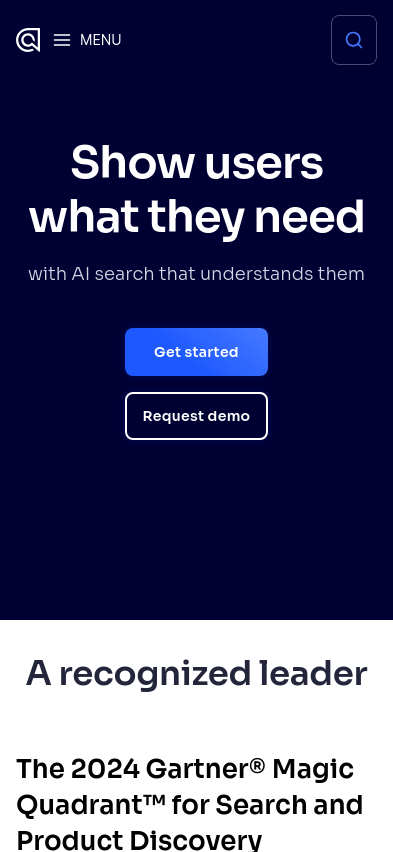
Algolia provides a powerful hosted search engine API for fast, relevant search.
Overview:
Algolia is focused on providing AI-powered search and discovery solutions designed to enhance user experiences across various digital platforms. Their core offerings lie primarily in AI Search, Browse, and Recommendations, which are meant to improve interactions between users and digital content, tailoring experiences to increase engagement and profitability for businesses.
Key Focus Area:
- Algolia’s key focus is on delivering efficient and scalable AI-driven search and discovery solutions to a broad array of industries, including retail, ecommerce, B2B, media, and SaaS companies. Their intent is to transform how digital interactions occur by providing personalized, dynamic, and relevant content to users throughout their online journey.
Unique Value Proposition and Strategic Advantage:
-
Algolia promotes its solutions as being extremely fast, with the ability to handle enormous volumes of data at scale, claiming to process 1.7 trillion searches annually while maintaining high uptime. Their platform stands out due to its AI capabilities, including dynamic re-ranking, personalization, and semantic search features, which combine to enhance user experiences and drive business outcomes like higher conversion rates and customer engagement.
-
The company positions itself as a leader with a broad international footprint, showcasing ease of integration with various ecommerce and content platforms like Shopify, Salesforce Commerce Cloud, and Adobe Commerce, facilitating quick implementation and scalability.
How They Deliver on Their Value Proposition:
-
API and Integrations: Algolia provides an API-first approach that allows businesses to seamlessly integrate search functionalities into their existing platforms with minimal setup time, offering diverse language support and extensibility through various SDKs and libraries.
-
Customization and Control: Businesses have the flexibility to tailor user experiences using pre-built UI components and comprehensive tools like the Merchandising Studio, which allows non-technical users to effectively manage and customize search outputs and marketing campaigns.
-
Data-Driven Insights: Through detailed analytics and real-time monitoring capabilities, Algolia assists businesses in understanding search behaviors and adjusting strategies to improve performance metrics like click-through rates and conversion.
-
Flexibility in Implementation: Catering to both technical and non-technical teams, Algolia allows businesses to utilize various AI capabilities to automate and refine search results based on business priorities and user behaviors.
-
Industry Compliance and Reliability: Ensuring high standards in security and compliance, Algolia prides itself on its high availability and data handling capacity, making it a reliable choice for businesses requiring robust search solutions.
In summary, Algolia targets enterprises looking to optimize digital search and discovery through advanced AI technology, positioning itself as a flexible, scalable, and intelligent solution capable of transforming user engagement and business performance.
Kern AI
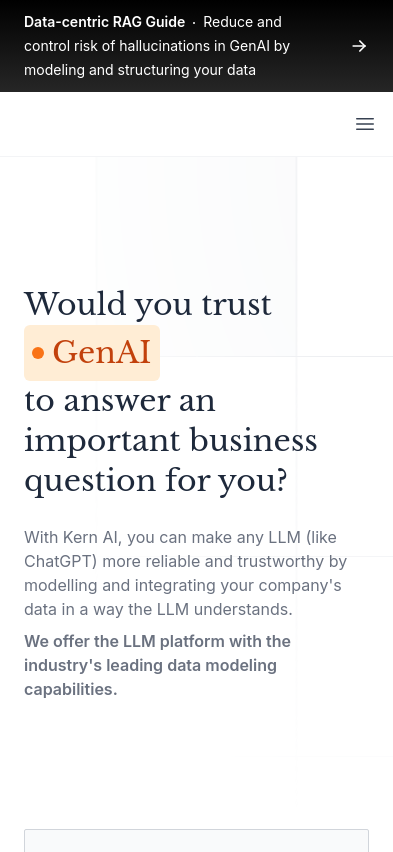
Kern AI provides a data-centric developer platform for natural language processing to help developers and data scientists turn their unstructured text into value.
1) Key Focus Area of Kern AI:
Kern AI focuses on enhancing the reliability of Large Language Models (LLMs) like ChatGPT by integrating and structuring company-specific data to improve data interaction and application efficiency. Their platform is designed to optimize the usage of LLMs by improving data integration, offering solutions primarily for industries where data accuracy is critical, such as insurance, customer service, and financial services.
2) Unique Value Proposition and Strategic Advantage:
-
Data-Centric RAG Approach: Kern AI's unique offering centers around its data-centric Retrieval-Augmented Generation (RAG) approach, which allows a deeper understanding and context-based interaction with data. By modeling and structuring data accurately, they enable LLMs to reduce errors (commonly known as hallucinations), making the AI responses more trustworthy and reliable.
-
Industry-Leading Data Modeling: Kern AI claims to have some of the most advanced data modeling capabilities in the industry, providing an edge in ensuring that AI applications reach a higher level of accuracy and reliability.
-
Customization and Flexibility: The platform's ability to be tailor-made for specific industry needs and its compatibility with various AI models (e.g., OpenAI, Azure, HuggingFace) add strategic flexibility to adapt to diverse client requirements.
3) Delivery on Value Proposition:
Kern AI delivers its value proposition primarily through a combination of enhanced data accessibility, automation, and strategic AI integration:
-
Enhanced Data Structuring: Kern AI focuses on structuring client data into an understandable format for LLMs. This involves modeling data in a user-friendly manner, such as a mindmap-like structure, improving the accuracy of information retrieval and response generation.
-
Automation of Core Processes: By automating complex and data-intensive processes, Kern AI boosts operational efficiency, reducing the time and error associated with manual tasks. For example, their portfolio analytics and risk management solutions enable insurers to analyze and manage risks with precision and reduced manual effort.
-
Application Integration: The company offers AI solutions as both APIs and user interfaces to cater to diverse operational needs, allowing clients to integrate these solutions directly into existing workflows, enhancing utility and usability.
-
Focus on Compliance and Security: Kern AI emphasizes security and compliance, ensuring that client data remains confidential and compliant with regulations like ISO 27001 and GDPR. This focus on data safety is crucial for industries handling sensitive information.
Through these strategies, Kern AI positions itself as a facilitator of digital transformation in conservative sectors like insurance and financial services, offering tools that aim to elevate customer experiences through efficient AI applications.
Jina AI

The article discusses frontier models for enterprise search and RAG systems, highlighting tools for enhanced content processing and contributions to notable conferences.
About | About | Contact | Contact | Careers | Contact | Contact | Jobs | Jobs | Jobs | Jobs | Jobs | Careers | Careers | Careers | Careers | About | About | About | Vision/Values | Vision/Values | About | About | About | About | About
Jina AI offers various advanced AI-driven tools and models for improving search relevance, data classification, and content processing, leveraging robust machine learning technologies. The platform's main products and services include:
Products and Services:
-
Reader: This feature allows users to convert any URL into markdown format to facilitate LLMs (Large Language Models). The Reader extracts content from URLs and returns it in a clean, LLM-friendly format for further processing or analysis.
-
Embeddings: Jina AI provides multilingual and multimodal embeddings that are crucial for search applications, especially for text and image retrieval tasks. These embeddings support 89 languages and can process high-resolution images.
-
Reranker: A neural tool designed to maximize search relevance by reevaluating initial search results. It uses advanced language understanding to match query intent more effectively with document content.
-
Classifier: Offers zero-shot and few-shot classification capabilities for text and image data. This tool categorizes input data into specified labels or categories, demonstrating flexibility and adaptability to varying contexts.
-
Segmenter: This tool cuts long text into manageable chunks and handles tokenization, making it easier to process parts of text separately for more precise computational analysis.
Key Features:
-
API and Integrations: Jina AI provides easy access through an API system, allowing seamless integration into existing workflows or products. This flexibility extends to major cloud services like AWS, Azure, and Google Cloud, facilitating on-premises and cloud-based applications.
-
Security and Compliance: The platform boasts SOC 2 Type 1 and 2 compliance, ensuring that operations meet high standards for data security and privacy.
-
Publications and Research: Jina AI supports robust research initiatives and continually contributes to academic forums, reflecting its innovative approaches to AI and search technologies.
-
Multilingual and Multimodal Support: Its models support various languages and can handle both textual and visual data, making it versatile for global and diverse use cases.
Operational and Developmental Aspects:
-
No Registration: The initial use of Jina AI's tools does not require a credit card or registration, allowing users to quickly try out capabilities without committing to purchases immediately.
-
Marketplace and Rate Limitations: Jina AI provides tiered access to its services based on API keys, with different usage limits based on rate and token usage as per the users' needs.
-
Educational Content: Alongside tools and services, the platform also offers learning resources and demonstrations of its technology via blog posts and API playgrounds.
Applications and Use Cases:
Jina AI's technology is applicable across various sectors needing advanced search capabilities, data organization, or information retrieval enhancements. Industries can implement these tools within customer support systems, knowledge databases, AI development frameworks, or digital content platforms to increase accuracy, relevancy, and efficiency in data processing and retrieval tasks.
In summary, Jina AI offers comprehensive AI-driven solutions tailored towards sophisticated search, classification, and content handling tasks optimized for enterprises seeking to enhance their data processing and retrieval capabilities across multilingual and multimodal fronts.